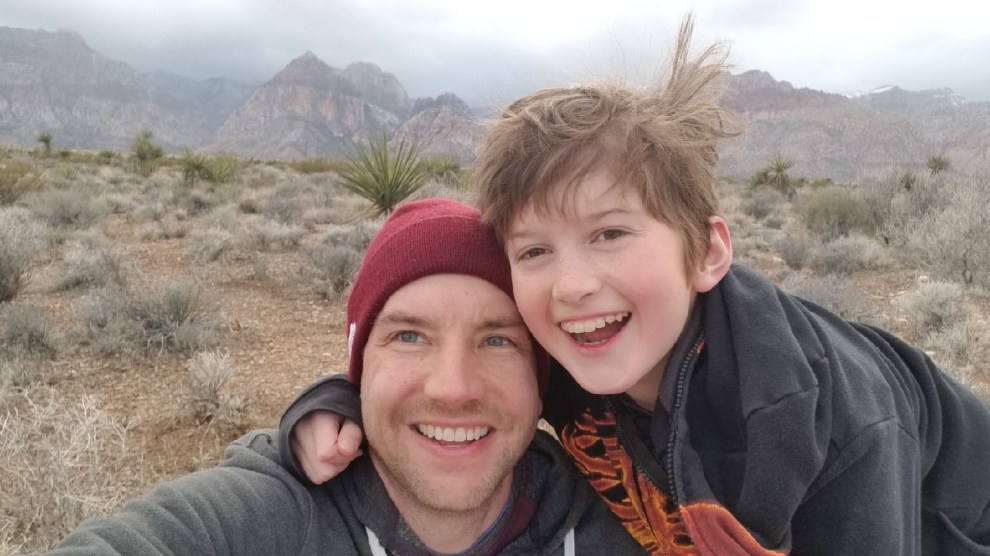
Adam Briggle and his sonCourtesy of the Briggles
In September 2016, Adam and Amber Briggle nervously prepared their Dallas-area home for a special dinner guest: Texas Attorney General Ken Paxton.
The Briggles were nervous because Paxton, a Republican, had recently filed a lawsuit to prevent transgender kids from using bathrooms that matched their gender identity; the Briggles’ own son, then eight, is transgender.
“Is he going to be mean?” Amber Briggle recalled their son asking before the attorney general arrived, according to the Dallas Morning News. “And I said, ‘No, and we’re not going to be mean to him. We’re hoping this dinner will keep him from being mean to trans kids in the future.'”
The couple had invited Paxton to their home to show him they were just a normal family, and that his anti-transgender stances were harming real people. And for the most part, the evening went well. Paxton and his wife sat at the table with the Briggles, eating kebabs and cornbread. They did not misgender the Briggles’ son, who, along with his little sister, excitedly gave the politician a tour of the house and showed off his toys.
But Paxton’s goodwill was short-lived. The attorney general continued with his lawsuit about bathrooms for months, only agreeing to drop it after the Obama administration left office and Donald Trump abandoned federal protections for trans kids.
And recently, Paxton took things a step further: In February, he issued a legal opinion that said it was child abuse to give teens medical care that can help with their gender transition—things like puberty blockers and hormone therapy that are widely accepted and described as life-saving by major medical associations. The same day, Texas Gov. Greg Abbott ordered the state agency for child protective services to scrutinize the parents of transgender kids as possible abusers. Within the week, the Briggles got a phone call informing them that their family was officially under investigation. A case worker soon arrived at their house to interview them and their son, who’s now 14, along with their 9-year-old daughter. The fact that it happened so quickly wasn’t an accident; employees at the protective services agency were instructed to prioritize investigations of gender-affirming care, according to one supervisor.
The Briggles tried to show the investigator that the kids are happy, with a pantry full of food and a trampoline in the backyard. Their son enjoys gymnastics and plays the ukulele, and their daughter does swimming and ballet. It was terrifying for them all, the prospect that the kids might be sent to foster care just because the attorney general—the same one with whom they had shared dinner in their own home—now apparently suspected them as abusers.
This afternoon, a Texas court issued a statewide injunction that temporarily prevents Texas officials from continuing their probe of the Briggles and other similar families. (The governor is expected to appeal.) Hours before the ruling, Adam Briggle called me from the car, on his way to pick up his children, to tell me what the investigation has been like for him and his kids. This interview has been edited for clarity.
Where were you when you found out that child protective services was opening the investigation? And what was your reaction?
I was lifting weights at the gym, a place I haven’t been to since, when my wife called to let me know. And my first reaction was panic. I worried because we’ve always thought we may have to leave Texas, just to be safe [for our trans son], kind of abstractly. But now my first thought was, “We might have to go now, but now we can’t because there’s an open investigation.” That was my first reaction as I was driving over to see Amber, because the CPS worker was coming to Amber’s office initially.
That sounds stressful. How did you and Amber prepare for the interview?
We got a lawyer quickly. And that was vital. It’s important for folks in our situation to get a lawyer and learn their rights and know that they don’t have to answer any questions other than your name and date of birth, basically.
Was there anything else you did to prepare before the interview?
We didn’t have time, because the CPS worker literally called us when she was half an hour away. So the fact that we even got a lawyer was amazing. We have contacts at Lambda Legal and other big organizations, and they were able to hustle and get a lawyer in Austin who was on his lunch break and dropped everything to get on the call, right when the CPS worker walked into our office.
That is really fast. After the CPS worker came to Amber’s office, was there a second interview at your home?
That’s right—at our home with the whole family. It’s an interview with the parents together and individually, an interview with the whole family together, and then with each child individually. We have two children.
Another thing we did: We got a separate lawyer for the children, just to represent them. That way that lawyer can be present with the CPS agent during their one-on-one interviews, kind of as an ally and a friend to let the children know what their rights are and when they don’t have to answer questions.
How long did the interviews last, and what sorts of questions did they ask you?
The whole thing felt like forever, but I guess it took about two hours. It’s humiliating. She asked me first, do I have a history of mental illness? And second, do I have a history of abuse? Like abusing my kids, my wife. Of course the answer is no. Then she asked about our social support network, like what kind of connections do we have in the community. And then she wanted to know what our daily routines are like. She wanted to see the house to see where we have food, to see if we have blankets, to see all the things you would want to see if somebody was really being a child abuser. It was surreal.
Did she ask about your kid’s medical history? Or to see documents about it?
Actually, this is the most important thing if anybody else is going to be in the situation, and I know other families are now: They will want you to sign a release form to release your medical records. We did not do that. And our lawyers told the CPS agent that we’re not talking about any of that stuff. And you could kind of see her adjust her strategy. She kind of went, “Oh,” and looked down at her script of questions, and essentially said, “Okay, well, I’m going to skip these questions.”
How were your kids reacting to all of this?
Well, Amber and I have been publicly raising a trans child and being a trans-inclusive family in Texas for about seven years now. And until now, we’ve been able to shield our children from the hatred that pervades our country’s politics, but I’m afraid now that it has walked through our door it’s taking a toll on them mentally and emotionally. So we’re not doing well, to put it bluntly. We get through the day, but it’s hanging over all of us.
And they’re pretty young, right? Your son is 14, and you have a 9-year-old daughter. How did you explain to them what was happening?
Well, I don’t know if we did it right. Because you never really imagine being in this situation. But I told the kids, “We’ve done nothing wrong. We never want you to lie. We’re not going to lie about anything. But we’re not going to answer questions, because the government is sending a spy into our house, and we don’t talk to spies. And we’re being interrogated for no legal or moral reasons.” It was, as you might imagine, scary for kids to hear that. But I didn’t know how to sugarcoat it. Because it’s very serious. You know, the consequences at stake for us are losing our child or uprooting our family. I’d lose my job, my health insurance. You look around the country, where could we move? There’s a guy who said he could maybe help me find a job in Arizona, but Arizona is hardly any better with this shit.
Arizona is one of the states that’s been considering a bill that would criminalize gender-affirming care too.
Yeah. Yeah.
And did the kids have any questions for you? Were they confused?
They were confused and scared. It’s hard to ask questions when something is so out of left field. And so out of the norm. It wasn’t so much that we got questions as we just got kind of blank stares. Why is this happening? And all we could really keep repeating is we’ve done nothing wrong. We’re just being attacked. There’s no good reason.
After the CPS worker left the house, what’s the timeline for the investigation? Do you have a sense of what the next steps are or when you might learn the outcome?
It’s unfortunately very open-ended. Initially they said 30 days is average, and then they said it can take twice that long. And then there’s a court hearing today that might grant an injunction that would pause all of these investigations, but I’m sure that would be appealed by the governor if that does happen, and so the legal wranglings around this could possibly extend the timeline more than the norm for these kinds of investigations. It’s very unsettling for us because we have no time frame.
In the meantime, are there other hoops you have to jump through, other things they’re making you submit or other interviews? Or was it basically just the interview at the house and then you wait?
Well, it’s interesting you ask because we thought that was it. But then we just got word from our lawyer that with some families, they are sending an agent out to interview the children at their schools. So we had a talk with our kids last night, a reminder that if they come to the school, you don’t have to answer any questions.
Your family has compiled a “safe folder” for you son, filled with documents and other proof that he’s happy. Did that start before this investigation?
Yeah, unfortunately, this is a best practice for any family that’s trying to just love their kid who’s transgender. And so we’ve had that for a long time.
If you’re a cis family, you don’t have to think about this. But if you’re a trans family, you do, because there was always a possibility somebody was going to come after you for being abusive, just simply because they’re ignorant and don’t understand. And so to have documentation that just shows your child is thriving as their authentic self is basically what a safe folder is all about.
What kinds of things do you have in there for your son, that show he’s thriving?
Testimonies from mental health professionals, educators, principals, friends. Artwork from our son that demonstrates that he’s happy. A Mother’s Day card about how much he loves his mom and appreciates the support she gives him. Those sorts of things.
How did it feel, after inviting Paxton to dinner, to see his recent opinion on trans kids and to learn that an investigation was being opened against you?
Like the depths of betrayal, basically. And utter cynicism on his part, that this is just a way to get through a primary season for him, just using us. He knows us. He said at the end of that dinner, he looked at our son, he said, “You got a good kid there.” By the way, it’s the same thing the CPS worker said after our visit. She looked at us and over at our son, who was practicing his cello at that point, and said, “Clearly you’re doing something right because you have wonderful children.” It’s maddening that we are going through this when anybody who meets us is like, “This is just a loving family.”
Have you reached out to Paxton again since the investigation was opened?
No, we haven’t. He’s made it plain that he’s not open to learning. I think what’s going on, like historically in this moment in time, is you have trans folks who feel like they can be out as their authentic selves within circles of friends or within safe communities. And the struggle we’re in now is how to achieve that liberation more widely in public society. And frankly, people like Paxton are just acting as the oppressors preventing that from happening. And at some point, dialogue is impossible with those sorts of people. So we tried, but he’s shown us his hand, and so there’s no point with him anymore.
Do you know how many other families are being investigated right now?
DFPS is saying it’s like five others, but then I’ve seen reporting that says there are more. I don’t know why it’s not more transparent about exactly how many. You don’t have to say who, obviously, but why they won’t say exactly how many, I’m not sure.
Is there anything else you want to add about the situation and how it’s affecting your family?
It’s hard to relive all this stuff. I mean, it’s important—I’m happy you’re covering it. A lot of people are asking what they can do. What I’d like allies to do is, on all levels of their life, to commit to doing something. So on the interpersonal level, please honor, acknowledge, and love people for who they are. Just build that as a practice. On the national level, even if you don’t live in Texas, one thing that we could do is call US senators and demand that they pass the Equality Act, because that’s a legislative instrument that would give us leverage to prevent the sort of state-level attacks that we’re facing now. We’ve been talking about the Equality Act for a long time, but this could be the window of opportunity where we get enough momentum.
As this investigation is going on, have you or the kids had to change your behavior in any way? It sounds like the kids are still going to school, but have you pulled back in any sense from public life?
Well, that’s a good question. We haven’t, other than: We used to use our son’s name [in media interviews], and now we aren’t. We know we can be doxxed, and we have been, but we just want to make it that much harder. It’s a weird balance to protect his privacy and yet fight for his rights, which requires speaking out.
But you know, just as another example, I am looking over my shoulder a lot more. We have a bumper sticker on our car that says, “Protect trans kids.” And I tell you what: I was just driving and I looked in my rearview mirror while I stopped at a red light, and the people behind me were taking a picture, both the driver and the passenger, of the bumper sticker. And then they were both shaking their heads angrily and disapprovingly. You know, I just feel this atmosphere of hostility growing around us, and that’s got me worried.












